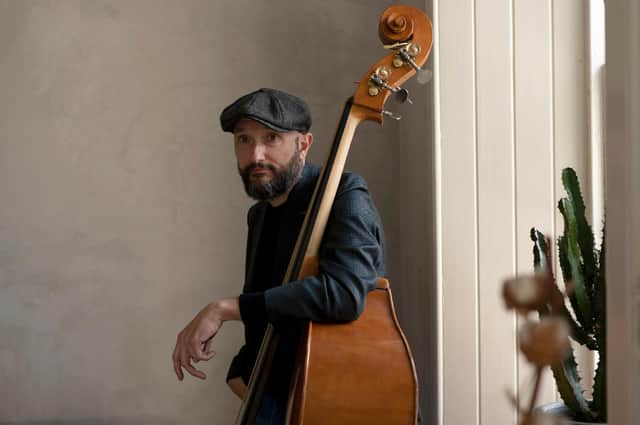Italian double-bassist Roberto Cassani’s new album is a salute to Scotland


Perthshire-based Italian double-bassist and singer Roberto Cassani’s new album celebrates the importance of community and solidarity in helping one another, particularly during the current pandemic. He has titled it Ansema We Stand, “ansema” translating into English as “together”, although one might also appropriately transcribe it into Scots as “thegither we staun”, as the album’s songs are in another so-called “minority language” – the Rivoltano dialect of his native Lombardy.
The album is also a salute to the influence Scotland and its music has had on the Scone-based musician over the past two decades, combining what he sees as “Two geographically small yet culturally gigantic traditions”. For it, he has enlisted some of the leading names on the Scottish scene, including Ross Ainslie on pipes and whistle, violinist Greg Lawson, guitarist and fiddler Anna Massie and accordionist John Somerville.
Advertisement
Hide AdAdvertisement
Hide AdCassani, now 45, had established a youthful music career in Italy being mentored by the celebrated jazz bassist Giovanni Tommaso, but came to the UK to broaden his experience and do voluntary work, then met his wife, who hails from Dunkeld. He then trained as a nurse and still works part-time as a district nurse, while – until lockdown at least – also playing with numerous Scottish folk and jazz musicians, including on occasion in the USA and Canada, not to mention a line in musical comedy which has taken him to the Fringe.
He wrote much of the album during lockdown, watching anxiously what was happening around his family and friends in his home town of Rivolta d’Adda, situated within one of Italy’s Covid “red zones” with tragically death rates. One of the album’s songs, Camion Militari, with its unrelentingly rolling bass and drums and wild tango violin, evokes the grim vision, reported to him by his mother, of army lorries transporting coffins for cremation elsewhere, the local morgues unable to cope.
Other songs are more positive, not least his title track, a rallying cry embodying what he defines as the spirit of the album, “spelling out that moments of crisis are occasions for us to acknowledge past errors, embrace diversities and truly work together as humans”. Other numbers, such as the rollicking La Santissima and the tarantella-like Evviva evoke the community spirit of fairs and festivals, while ‘Mpestada Quarantena is a gently affectionate paean to the osterias of his childhood, where old men would burst into traditional song.
When I suggest that I find the melody of that last song reminiscent of Annie Laurie, Cassani says it was actually inspired by a South American folk song he heard, but he is, however, enthusiastic about Robert Burns’s poetry and song and, indeed, finishes the album with An Basi’, his adaptation of Ae Fond Kiss. The Ayrshire bard, he says, “has a lot of things in common with the way we see the world in the rural north of Italy. And that resonated with me quite a lot.”
At a time when the Scots tongue is undergoing reinvigoration, it’s intriguing to see another minority language, this one from abroad, in creatively cosmopolitan partnership with Scots m usic. In Italy, Cassani explains, the situation is all too familiar, with local language forms such as the various dialects of Lombardy being educated out in favour of “proper” Italian, although he regards the current health of
Scots as “light years ahead” of that. “We were probably the last generation brought up speaking dialect.”
Once some sort of normality, whatever form that might take, is restored, he hopes to be able to tour with the album both here and in Italy, but in the current uncertainty, any attempt to fix dates inevitably becomes stuck, “like that big ship in the Suez canal”.
Advertisement
Hide AdAdvertisement
Hide AdIn the meantime, Ansema We Stand may have been born of the pandemic, but its message is one of positivity: “The one light that shone brightly, both in Scotland and in Italy, was the people’s willingness to look after each other.”
For more information, see www.robertocassani.com
A message from the Editor:
Thank you for reading this article. We're more reliant on your support than ever as the shift in consumer habits brought about by coronavirus impacts our advertisers.
If you haven't already, please consider supporting our trusted, fact-checked journalism by taking out a digital subscription at https://www.scotsman.com/subscriptions